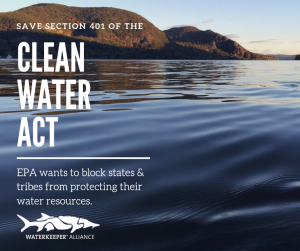From an Article by Lisa Friedman, New York Times, June 1, 2020
WASHINGTON — The Environmental Protection Agency on Monday announced that it had limited states’ ability to block the construction of energy infrastructure projects, part of the Trump administration’s goal of promoting gas pipelines, coal terminals and other fossil fuel development.
The completed rule curtails sections of the U.S. Clean Water Act that New York has used to block an interstate gas pipeline, and Washington employed to oppose a coal export terminal. The move is expected to set up a legal clash with Democratic governors who have sought to block fossil fuel projects.
Specifically, it limits to one year the amount of time states and tribes can take to review a project and restricts states to taking water quality only into consideration when judging permits. The Trump administration has accused some states of blocking projects for reasons that go beyond clean water considerations, such as climate change impacts.
Andrew Wheeler, the administrator of the E.P.A., said the agency was moving to “curb abuses of the Clean Water Act that have held our nation’s energy infrastructure projects hostage, and to put in place clear guidelines that finally give these projects a path forward.” States, he said, would no longer be allowed to use the law to object to projects “under the auspices of climate change.”
The rule was initially proposed in August shortly after President Trump issued an executive order directing agencies to “promote efficient permitting processes and reduce regulatory uncertainties that currently make energy infrastructure projects expensive and that discourage new investment.”
Mr. Trump then directed the E.P.A. to revise rules for permits issued under Section 401 of the Clean Water Act, which gives states and tribes the ability to judge the potential impact that energy projects and other construction proposals might have on water quality. He called the current rules “outdated.”
The American Gas Association, which represents natural gas distribution and transmission companies, praised the changes and described states’ objections to pipelines and other projects as “abuse.”
“The new final rule will end the practice of states misusing Section 401, putting political ideology and the goal of blocking natural gas pipelines over the important task of protecting our nation’s water quality,” Karen A. Harbert, the president and chief executive of the association, said in a statement.
Democratic lawmakers and environmental groups have denounced the rule and said it infringes on states’ rights. Section 401, they said, has been a critical tool for states to protect their drinking water quality. They also argued that the time restrictions will burden states that have limited resources to evaluate complicated projects. Companies will now have an incentive to run out the clock by delaying requests to submit data.
“In the latest example of the Trump administration’s disdain for the rule of law, it is trying to excise states’ clean water rights to object to projects that violate state water quality standards,” said David Hayes, who runs the State Energy & Environmental Impact Center at the New York University School of Law.
Clean water law experts also noted the Supreme Court in 1994 explicitly affirmed states’ authority to impose conditions on projects based on state law.
“It’s a pretty significant retreat from what they were doing the last 40 years,” said Mark Ryan, a Clean Water Act expert who served as regional counsel for the E.P.A. in its Pacific Northwest regional office.
He predicted the rule would be “very vulnerable” to a legal challenge, adding, “the E.P.A. will have a very hard time convincing the Supreme Court that its current interpretation of the Clean Water Act is correct.”
The Trump administration has particularly criticized New York for its lengthy battle to block an interstate pipeline, the Williams Companies’ Constitution natural gas pipeline from Pennsylvania. And in 2017, Gov. Jay Inslee of Washington used the 401 provision to block a permit for a coal export facility that would have shipped fuel to Asian markets.
On Monday Mr. Wheeler called the decision by Gov. Andrew Cuomo of New York to reject the Constitution line “probably the worst environmental decision by an elected official last year.”
>>> A version of this article appears in print on June 2, 2020, Section A, Page 27 of the New York edition with the headline: E.P.A. Limits States’ Power To Oppose Energy Projects.

